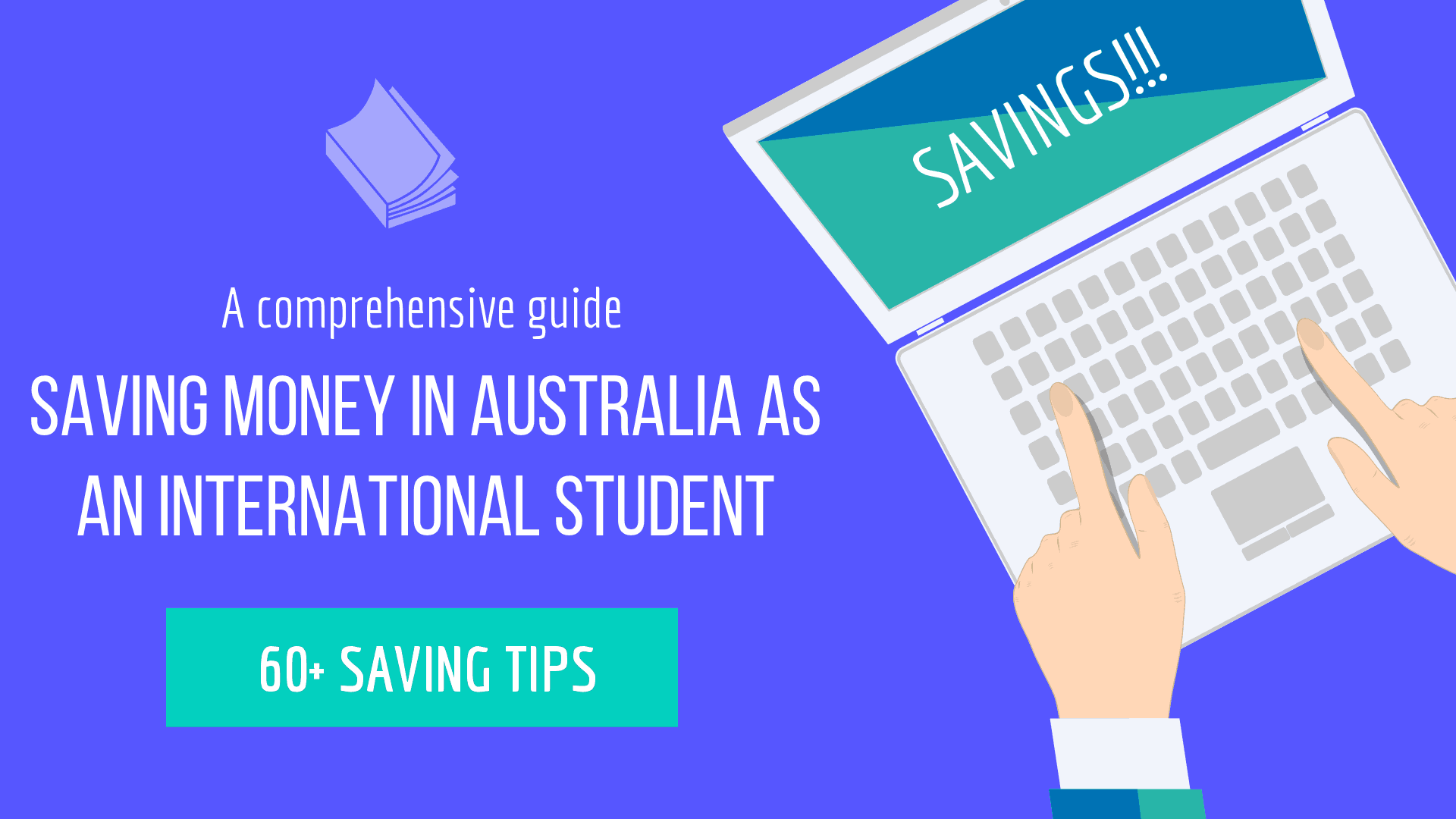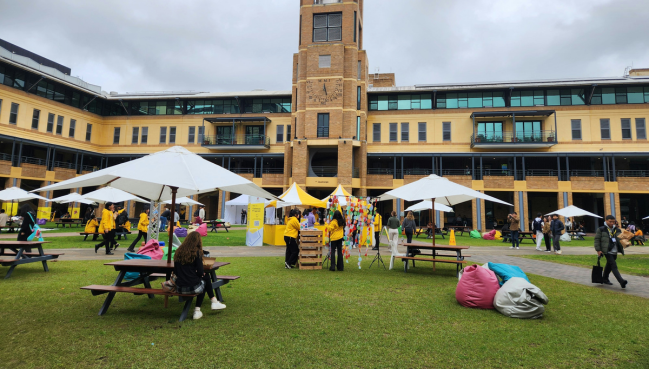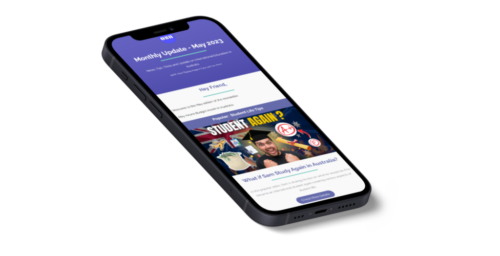60+ Money Saving Tips for Students in Australia

If you are an overseas student in Australia, chances are that you might be on a tight budget. Saving some money here and there can certainly help in making life easier. So we decided to create this guide in order to rescue you, so you can save money using some of the practical strategies in the various aspects of life. Before we begin, we suggest you join our Facebook Group as we post heaps of freebies there. Let’s start saving money without further delaying:
Textbook and course supplies

- For saving money in regard to textbooks, we suggest you either borrow books from the library to study.
- But surely those books are either not available in the library or just already been loaned by someone. Then, the best bet is to buy the used/old textbooks from people who have already finished the subject.
- Usually, students post ads in university for textbooks or online in university forums or even gumtree.
- In regard to things like stationery and other course supplies, if it’s cheaper, get that from your home country.
- Otherwise, we suggest you go to Kmart and Officeworks to find cheap supplies.
- If you need to have software for your studies like Microsoft Office or Photoshop, then look out for some free alternatives you can instead of paid service. For example, you can use LibreOffice or Google Docs, Sheets or Slides instead of Microsoft Office. There are many other free open source alternatives available for the software these days, so go and search them out.
Accommodation

- If you are renting the accommodation through a private landlord or an agent, we always suggest you to try to negotiate for a rent. Yes! You can actually do that. But be reasonable and don’t try to negotiate too hard. The worst case in negotiating nicely is that the person may say no but it is always worth trying.
- Secondly, in order to save money, try to share the house with others. If you want to save even more, then you can share a room as well.
- Even, if the landlord doesn’t want to negotiate on the rent, they might be open to discuss the share some of the bills like electricity, water, gas and internet. Try to get that included in your rental costs.
- Make sure you always compare if renting an apartment by yourself is a better option or living in student accommodation is the way to go as they usually include all the bills, furniture and some extra services like gyms, swimming pools, entertainment activities
Transport

- If you really want to save some money on transport then you should try to find the accommodation closer to your university or institution.
- Although, sometimes it can be more expensive to live too close to the university or institution, in that case, try to buy the bike (bicycle) from Gumtree or Kmart and ride along. It is not only cheaper but a much healthier option as well.
- But if you have to choose public transport, then you should see if the student concession is available to buy the tickets or not in your state or territory you are living in Australia.
- Most of the university students are entitled to public transport concessions but again it depends on the state or territory you are studying in, so please check if that is available for you or not.
- If possible, try to use public transport in the off-peak hours as the fare costs are much cheaper than.
- We also suggest you choose your timetable in a way that you can catch public transport in the off-peak hours
- We don’t recommend overseas students to use Taxi’s as they are quite expensive in Australia. If you have to travel somewhere and no other public transport is available, then we suggest you use ride-sharing service like Uber, Ola, Didi, Taxify instead.
Groceries

- Try to learn basic cooking so you don’t eat out too often as it can be very expensive on the pocket.
- If you cook at home, try to bring your lunch from home as it will save heaps
- Always look out for specials of the week from the major supermarkets like Woolworths, Coles and Aldi.
- Don’t forget to get those loyalty cards from the big supermarkets as they usually offer special deals and when you accumulate 2,000 points, you can claim up to $10.
- Try not to shop a lot at convenience stores like 7-eleven as they can be expensive in Australia (unless you are buying $1 coffee).
- If you want to save further 5% on groceries, then you can buy Woolworths gift cards from cash rewards or shop back and save 5% further on your grocery bills.
- Always plan ahead and cook enough for yourself and avoid wasting food at all
- If you are planning to buy your country specific items then we suggest you find out local grocery shops as they might be selling groceries cheaper than big supermarkets.
- Never go shopping on an empty stomach.
- Always make a list of items you will need to buy before you go for grocery shopping.
Clothing

- One of the best ways to save money when buying clothes is to buy off season. So, buy winter clothes in summer and summer clothes in winters.
- Always look out for special offers, sales and deals as they are offered during certain times in a year, for example, boxing day, black friday, cyber monday, Australia day etc.
- If you are looking for specific brands then rather than going to the premium stores, you should always look for factory outlet stores, which you can find in the shopping centres like DFO’s.
- If you are on a tight budget and would still have to buy some clothes, then we suggest you to head to stores like Salvation Army, Vinnies and local op-shops for affordable and pre-loved items.
- If you are shopping online, then we suggest you use cashback websites like Cashrewards, Shopback as you can get cash back on lots of your purchases.
- Always look out for eBay promotional codes and Amazon deals for more saving online.
- You can also visit some local weekend markets and look for some inexpensive bargains there.
Bills/Utilities

- The first saving tip for the bills is a no-brainer as it is always good to use as much as needed and switch off the items when not in use as it will do wonders for the saving those hefty bills
- Always shop around for the best possible deal for things like electricity, gas, internet and mobile phone plans. Use government websites to compare and save on gas and electricity.
- There are plenty of websites to compare and save money for your utility, internet and mobile phone bills.
- If you are using mobile plan and it is up for renewal, then we suggest you to tell your current provider that you will take the business to other providers if they don’t offer a better or cheaper deal. This strategy can also work for the internet provider and utility providers also.
- Unless you are on a plan or contract, changing providers are usually very easy and simple. We recommend you switching providers if you get a better deal elsewhere (No hard feelings!)
Banking

- If you work and have saved up some money, then look for a bank that offers the best interest rates.
- Typically, the big 4 banks don’t give the best interest rates, so we suggest you shop around and find out the best rates for your hard earned money.
- As a student, you shouldn’t be paying any account keeping fees
- Avoid credit cards as they usually carry yearly costs and the interest rates can be very high if you don’t pay back in time.
- If you are transferring money from overseas to Australia or vice versa, check the exchange rates, fees, minimum and maximum amounts you send/receive and see if the banks or other money transfer ways works out better for you.
Eating out
- Always look out for deals, special offers, there are lots of websites like Groupon, Scoopon and apps like Liven which can help you save heaps on eating out.
- Lots of places especially close to the university campuses will have deals on for the students regularly.
- Tips are not necessary in Australia, so you don’t need to tip and save some money there.
- Avoid eating out on the weekend as it can be hard to find special deals and offers as restaurants are usually busy.
- If you are celebrating your birthday, you can check out these deals and pretty much eat out for Free for few days around your birthday. (Make sure to sign up for the services at least a month before your birthday)
Haircuts and grooming

- Look out for some training schools as they might need hair models for their training purposes.
- If you want to go to Salon, then find out about their weekly specials. Usually, prices for the haircut are cheaper during the weekdays.
- Students also usually get discounts for the haircut, so don’t forget to ask for that before the cut.
Gym Memberships

- Look up for promotions and offers available in the gyms around your area.
- If you are studying in university or TAFE, chances are they may have gyms available on the campus itself.
- Make use of the free trails available as usually there are gyms offering for people to sign up.
- Use friend’s referrals as you both might be getting benefit or rewards for the signup.
- There are plenty of parks, gardens available in Australia for jogging, running and general fitness, and you don’t need to pay anything for that
- Look for some free community fitness classes in your local area by joining some Facebook groups.
Night outs

- Always bring cash only when going out in the night.
- Leave your debit/credit cards at home as it will allow you to stay within your budgets if you just bring cash only.
- Use public transport instead of your own car and taxies.
- If you are going for drinks, start at home as it will save you heaps.
- Enter the nightclub nice and early as the fees for most nightclubs increase after 11.
- Never withdraw money at Casino, nightclubs or bar ATMs as they tend to charge high fees.
- And if you don’t have money at all, then stay home.
Movies

- Always watch a movie during off-peak hours (usually morning sessions and weekday nights).
- Tuesday tends to be the cheapest day for watching movies in cinema.
- Look out 2 for 1 deals from various providers or Groupon.
- If you like watching movies too often then keeping that Netflix subscription ($9.99) might be the way to go
If you liked this article, then you might also want to check our article on Back to Uni essentials (with free checklist included) here.




